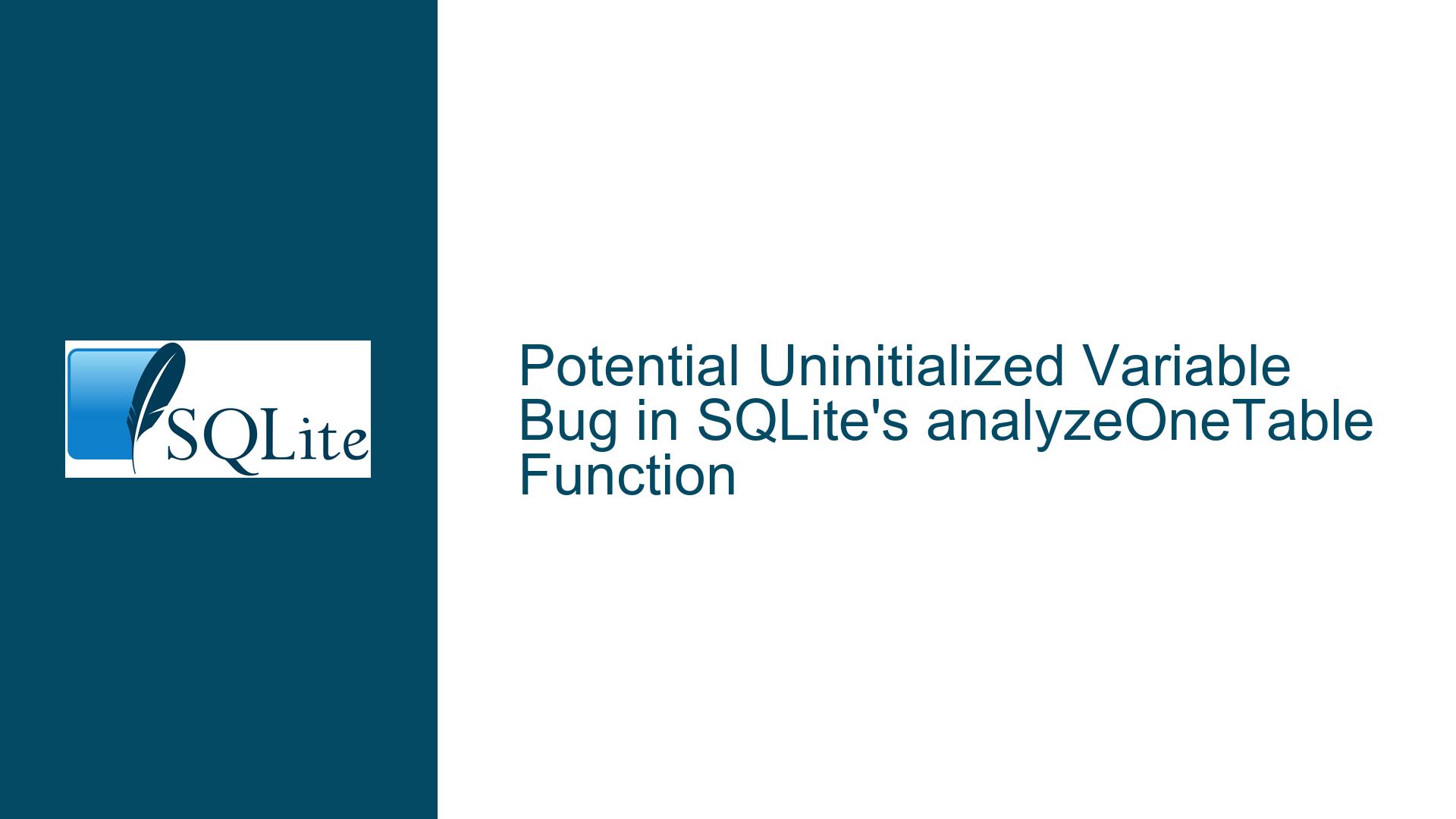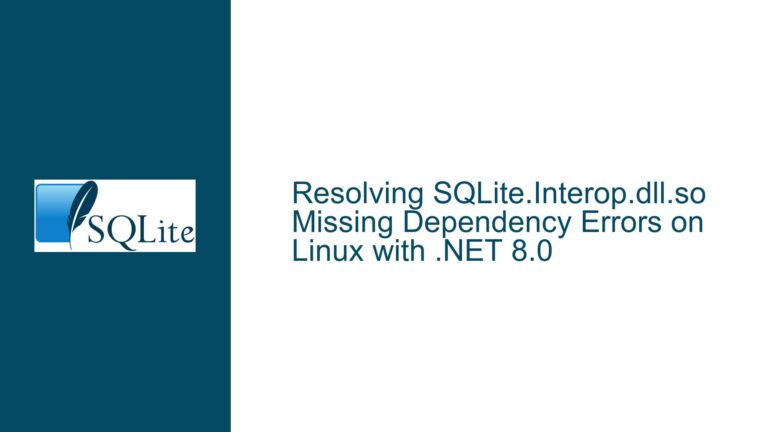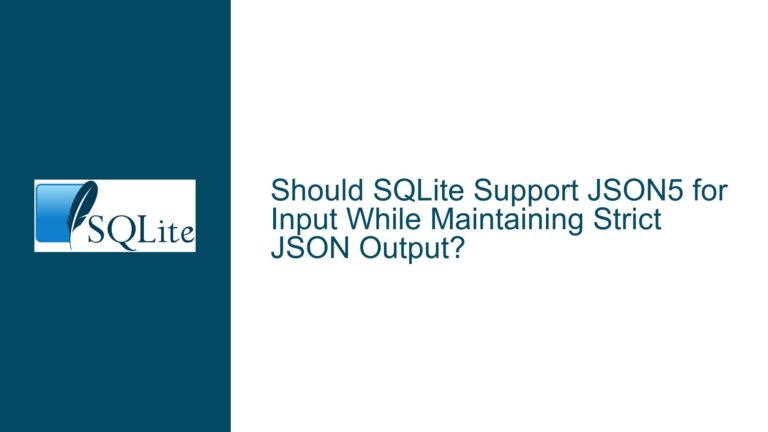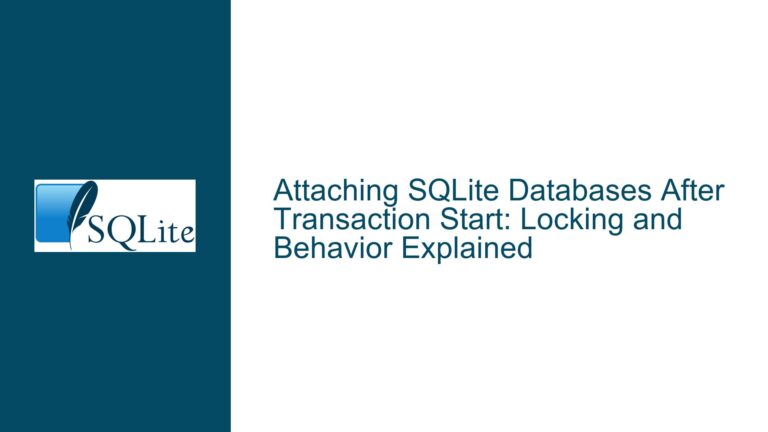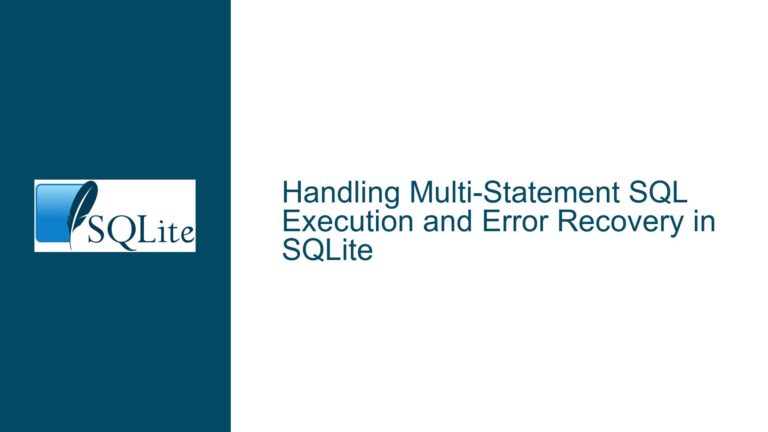Potential Uninitialized Variable Bug in SQLite’s analyzeOneTable Function
Uninitialized Variable Usage in analyzeOneTable Function
The core issue revolves around the potential misuse of an uninitialized variable i in the analyzeOneTable function within SQLite’s source code, specifically in the file src/analyze.c. The problematic code snippet involves a loop that iterates over the columns of a primary key (pPk), where the variable i is referenced in a VdbeComment macro without being initialized. This raises concerns about the correctness of the code and the potential for undefined behavior during execution.
The code in question is part of SQLite’s query optimization process, where the analyzeOneTable function is responsible for analyzing the statistics of a table to help the query planner make informed decisions. The function generates virtual machine code (VDBE) to collect statistical data about the table’s indices. The loop in question is intended to iterate over the columns of the primary key and generate corresponding VDBE operations to fetch column values.
The VdbeComment macro is used to add comments to the generated VDBE code, which can be helpful for debugging and understanding the generated bytecode. However, the comment generated in this case references the variable i, which has not been initialized or assigned a value within the scope of the loop. This oversight could lead to incorrect comments in the VDBE code, making debugging more challenging, and potentially causing confusion for developers who rely on these comments to understand the generated bytecode.
The GCC compiler has flagged this issue by reporting the usage of an uninitialized variable. This is a significant warning because using uninitialized variables can lead to undefined behavior, which might manifest as erratic program behavior, crashes, or security vulnerabilities. In the context of SQLite, such issues could potentially lead to incorrect query optimization, data corruption, or even database crashes.
Misuse of Loop Index in VdbeComment Macro
The primary cause of this issue is the incorrect usage of the variable i in the VdbeComment macro. The variable i is declared at the beginning of the function but is not initialized or used in the context of the loop where the VdbeComment macro is invoked. Instead, the loop uses the variable j to iterate over the columns of the primary key. The VdbeComment macro, however, references i instead of j, which is likely a typographical error or an oversight during code development.
The VdbeComment macro is designed to add descriptive comments to the generated VDBE code, which can be invaluable for debugging and understanding the behavior of the SQLite engine. However, if the comments are incorrect due to the misuse of variables, they can mislead developers and make debugging more difficult. In this case, the comment is intended to describe which column of the index is being processed, but because it references the uninitialized variable i, the comment will not accurately reflect the actual column being processed.
Another potential cause of this issue could be related to the evolution of the codebase over time. SQLite is a mature and highly optimized database engine, and its codebase has undergone numerous changes and optimizations over the years. It is possible that the variable i was used in an earlier version of the code, but its usage was removed or refactored, leaving behind this residual reference in the VdbeComment macro. This kind of issue can often go unnoticed during code reviews, especially if the code compiles without warnings and the comments are not closely scrutinized.
The impact of this issue is primarily on the maintainability and debuggability of the SQLite codebase. While it may not directly affect the functionality of the database engine, incorrect comments in the VDBE code can lead to confusion and wasted effort for developers who rely on these comments to understand the behavior of the generated bytecode. Additionally, the use of an uninitialized variable is a potential source of undefined behavior, which could lead to more serious issues in certain scenarios.
Correcting the VdbeComment Macro and Ensuring Variable Initialization
To address this issue, the first step is to correct the VdbeComment macro to reference the correct variable j instead of the uninitialized variable i. This change will ensure that the comments in the generated VDBE code accurately reflect the columns being processed by the loop. The corrected code should look like this:
int i;
...
int j, k, regKey;
for(j=0; j<pPk->nKeyCol; j++){
k = sqlite3TableColumnToIndex(pIdx, pPk->aiColumn[j]);
assert( k>=0 && k<pIdx->nColumn );
sqlite3VdbeAddOp3(v, OP_Column, iIdxCur, k, regKey+j);
VdbeComment((v, "%s.column(%d)", pIdx->zName, j)); // Corrected: Use 'j' instead of 'i'
This change ensures that the comment accurately describes the column being processed, which will aid in debugging and understanding the generated VDBE code. Additionally, it eliminates the warning about the use of an uninitialized variable, reducing the risk of undefined behavior.
The next step is to ensure that all variables used in the function are properly initialized before they are referenced. In this case, the variable i is declared but not used in the loop. If i is not needed in the function, it should be removed to avoid confusion and potential issues in the future. If i is needed elsewhere in the function, it should be initialized before it is used.
To further enhance the robustness of the code, it is recommended to enable compiler warnings and treat them as errors during the build process. This will help catch similar issues early in the development cycle and prevent them from being introduced into the codebase. For example, using the -Werror flag with GCC will treat all warnings as errors, ensuring that the code must be free of warnings before it can be compiled successfully.
In addition to correcting the immediate issue, it is also important to review the surrounding code for similar issues. This includes checking for other instances where variables may be used without being initialized, or where comments may not accurately reflect the code’s behavior. A thorough code review, possibly aided by static analysis tools, can help identify and address these issues before they become problems.
Finally, it is important to document the changes made to the code and the reasons for those changes. This documentation will help other developers understand the rationale behind the changes and prevent similar issues from being introduced in the future. The documentation should include a description of the issue, the changes made to address it, and any potential impact on the behavior of the code.
By taking these steps, the issue of the uninitialized variable in the analyzeOneTable function can be effectively resolved, improving the maintainability and reliability of the SQLite codebase. This will help ensure that the database engine continues to perform optimally and that developers can rely on the accuracy of the generated VDBE code comments for debugging and understanding the behavior of the SQLite engine.
